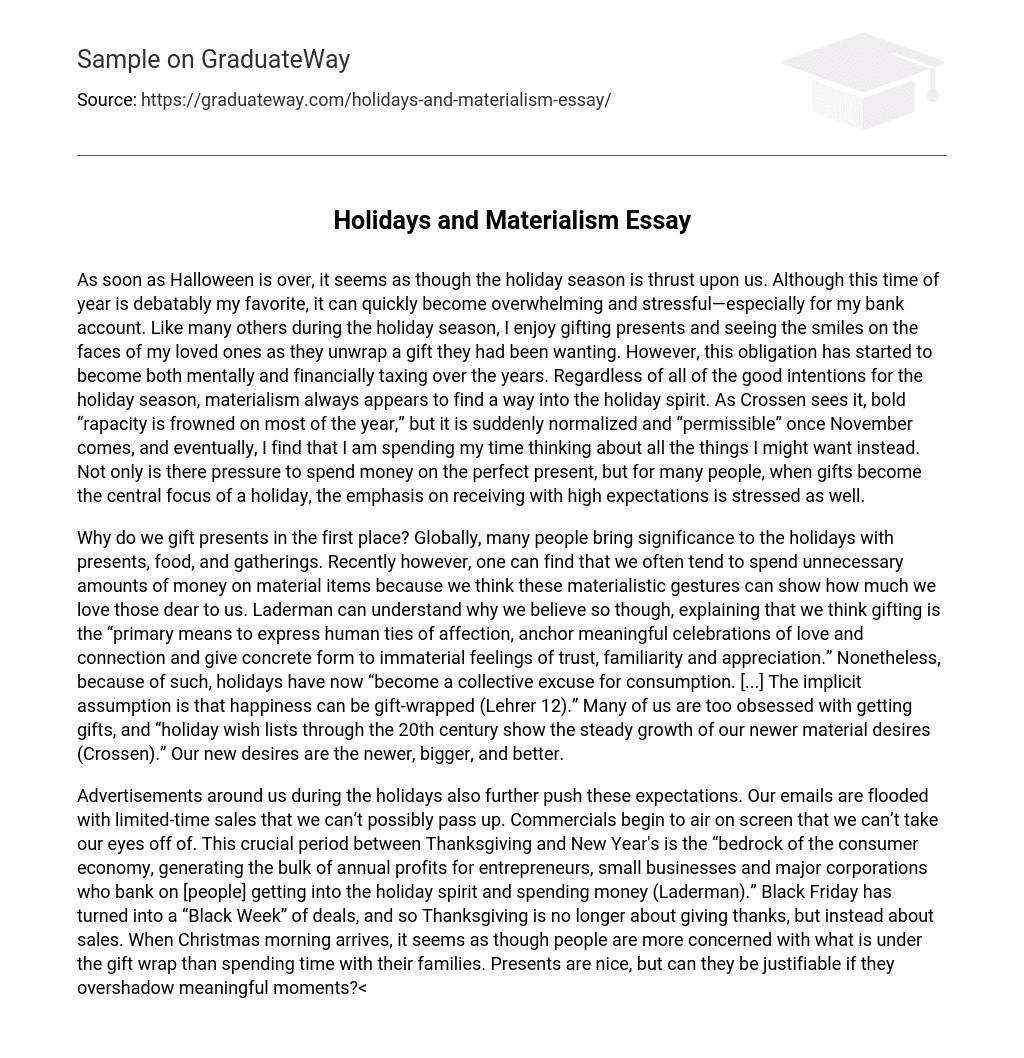As soon as Halloween is over, it seems as though the holiday season is thrust upon us. Although this time of year is debatably my favorite, it can quickly become overwhelming and stressful—especially for my bank account. Like many others during the holiday season, I enjoy gifting presents and seeing the smiles on the faces of my loved ones as they unwrap a gift they had been wanting. However, this obligation has started to become both mentally and financially taxing over the years. Regardless of all of the good intentions for the holiday season, materialism always appears to find a way into the holiday spirit. As Crossen sees it, bold “rapacity is frowned on most of the year,” but it is suddenly normalized and “permissible” once November comes, and eventually, I find that I am spending my time thinking about all the things I might want instead. Not only is there pressure to spend money on the perfect present, but for many people, when gifts become the central focus of a holiday, the emphasis on receiving with high expectations is stressed as well.
Why do we gift presents in the first place? Globally, many people bring significance to the holidays with presents, food, and gatherings. Recently however, one can find that we often tend to spend unnecessary amounts of money on material items because we think these materialistic gestures can show how much we love those dear to us. Laderman can understand why we believe so though, explaining that we think gifting is the “primary means to express human ties of affection, anchor meaningful celebrations of love and connection and give concrete form to immaterial feelings of trust, familiarity and appreciation.” Nonetheless, because of such, holidays have now “become a collective excuse for consumption. […] The implicit assumption is that happiness can be gift-wrapped (Lehrer 12).” Many of us are too obsessed with getting gifts, and “holiday wish lists through the 20th century show the steady growth of our newer material desires (Crossen).” Our new desires are the newer, bigger, and better.
Advertisements around us during the holidays also further push these expectations. Our emails are flooded with limited-time sales that we can’t possibly pass up. Commercials begin to air on screen that we can’t take our eyes off of. This crucial period between Thanksgiving and New Year’s is the “bedrock of the consumer economy, generating the bulk of annual profits for entrepreneurs, small businesses and major corporations who bank on [people] getting into the holiday spirit and spending money (Laderman).” Black Friday has turned into a “Black Week” of deals, and so Thanksgiving is no longer about giving thanks, but instead about sales. When Christmas morning arrives, it seems as though people are more concerned with what is under the gift wrap than spending time with their families. Presents are nice, but can they be justifiable if they overshadow meaningful moments?
Giving and receiving presents have always been a part of the holiday experience in some way or form, but now it seems as though it has come to overtake the greater meaning of the holiday season. We have to remember that the gifts themselves “do not matter because of anything inherent in the matter itself, but in the material capacity to transmit feelings and reinvigorate significant relationships” (Laderman). The feelings of happiness and joy that we find in these material items are dependant on the “feelings and beliefs we bring to them (Leher 12).” Whether it is Thanksgiving, Christmas, Hanukkah, Kwanzaa, or New Year’s, the holiday season offers us a chance to think back on what makes life genuine and meaningful—and those don’t come in wrapping paper.





